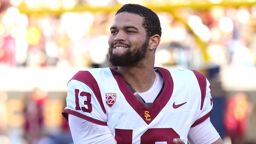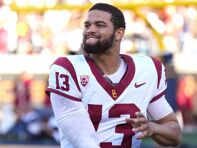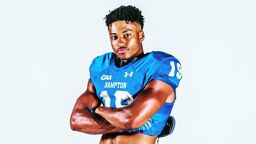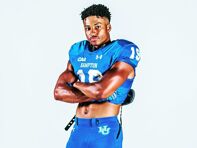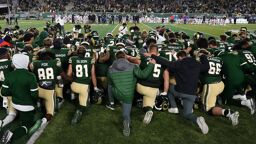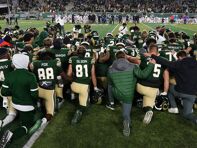My entire life has been a balance of dualities.
I have a passion for football that is unmatched by anything else in my life. While football has provided me with such an incredible array of opportunities, both on and off the field, it has also torn my life apart and sent me spiraling down to rock bottom.
As with most young gay athletes, I struggled to cope with my own acceptance of my homosexuality. At the same time I was also part of a team that did everything in its power to show the world it would never support me, or anyone, as a gay athlete.
This isn’t news. Sadly these are the struggles of countless gay athletes in football and on far too many other sports teams.
That isn’t to say I didn’t try to fix it before I quit. I tried to use the resources provided by the school. I tried to be open and accepting of myself. I tried to focus on getting the support necessary from my team to achieve my athletic goals.
I tried and I failed.
I don’t want to gloss over the dark parts of my journey and skip to the end where I am perfectly okay and doing well. I’m telling the story of my darkest failure.
My first year at Queen’s University was anything but easy. Moving to a new province and joining a new team, while being alone for the first time, left me dealing with depression and a complex series of internal issues regarding my sexuality. This, paired with a rigorous football schedule, was exhausting and taking its toll on my mental and physical well-being.
I found that the football environment at a liberal arts school was much more homophobic than I was anticipating.
I had a lot of trouble bonding with my fellow teammates and, much to my surprise, I found that the football environment at a liberal arts school was much more homophobic than I was anticipating.
It was more than just the odd joke or comment here or there. My teammates would actively change their tinder preferences to find gay students in the area and out them to the campus to ridicule them. They actually did that.
I would enter the locker room to find written on the chalkboard, “X teammate uses Grindr Plus.” It was their way to insinuate that they were less of an athlete by comparing them to a gay man.
It speaks to the culture and ideology of my team at that time: If you were gay you were less-than. Less of a teammate. Less of an athlete. Less of a man.
Going to football practice was a constant reminder that the identity I was struggling with was seen as the worst thing an athlete on my team could be. So, I hid.
Even with this, football was my refuge from the daily struggle within my own head. It was the only aspect of my identity that I actually wanted to be a part of me. I didn’t want to stand under the shadow of that rainbow flag because it meant that I would never be able to stand with my team.
The paralyzing fear that loomed over my entire life eventually lead to feelings of loneliness and isolation. There was no escaping the torment of my own thoughts.
After almost an entire semester of solitude, I crumbled. I realized that I needed help, I couldn’t do it alone. I attempted to use the resources that my university had so gleefully touted all over campus. Unfortunately, they were underfunded and understaffed. At that time, they lacked the adequate understanding of mental health for their LGBTQ+ students.
The only “treatment” I was given was being told to join a club for gay students – the last thing a gay athlete wanted to hear. I didn’t know where to turn. I couldn’t join those clubs, I would be outing myself.
I felt hopeless. The only thing in my life that brought me any significant source of joy was football, and every day that seemed less and less compatible with who I was.

I hated myself. I hated everything. A week after attempting to get adequate mental health assistance, I laid alone in my dorm room with a handful of pills and only one thing on my mind.
Somehow I found the courage to befriend a guy I secretly talked to on Grindr. Just downloading a gay dating app had been a huge step. Having a gay friend I could talk to suddenly gave me hope. Yet there was a lot of damage to work through. I still refused to believe that I could ever be happy.
I couldn’t get that out of my head. I could never be happy. It consumed me at night, the feeling that nothing else mattered but escaping the torment of my life. I could think of only one way out, and I was preparing to take it… when suddenly he was there. In my darkest hour, he helped stop my fall to rock bottom, and he refused to let me fall any further.
I now had a confidant who understood my struggle, and I began to feel less alone in the world.
I’ve never given up on anything. Not once. He saved me from giving up on life. I now had a confidant who understood my struggle, and I began to feel less alone in the world. Finishing that semester was the toughest challenge I’ve ever had to overcome, but I was determined not to let the darkness, that seemed to engulf my entire life, win.
I came home that summer determined to make a change. I needed my friends’ and family’s support more than ever. I told my closest friends and my parents that I was gay. They embraced me with open arms and I was met with a wave of support. For most of my life I had been running away from the people who cared for me because I was afraid.
It was an indescribable feeling to suddenly be able to talk to the people I care for about the struggles I’d been hiding from them. I decided then to leave the toxic locker room at Queen’s University and return home to join the Winnipeg Rifles of the Canadian Junior Football League.
It was only a few months ago that I told my first teammate. I still haven’t told everyone I need to tell, but it is a process.
This article is one step in that journey. It is a testament to where I am now, and where I want to be in future. Being a gay athlete means that there is always going to be unfair obstacles I have to overcome.
Currently, I like to think that the hardship I experienced as a closeted football player made me stronger and pushed me further.
My story is unfinished, and I have a long and uncertain journey ahead. But I know I’m headed in the right direction. I’m not sure where this road will take me, but it was important for me to tell the story of my faults. I feel we often get caught up in the stories of bravery in the face of adversity. And don’t get me wrong, those true stories of courage are needed.
But I wanted to acknowledge my failures that have gotten me here, and the strength it took to overcome them. When I was in my darkest place, reading a story of someone else’s successes felt distant, unrelatable and unachievable. My football successes can someday be summed up on the back of a trading card, and I’m proud of them. But I’m far prouder of surviving my failures than of my successes.
Donovan Hillary, 22, is a middle linebacker for the Winnipeg Rifles. He formerly played for Queen’s University. He can be reached at [email protected], or on Instagram @donovanhillary.
Editor: Cyd Zeigler


